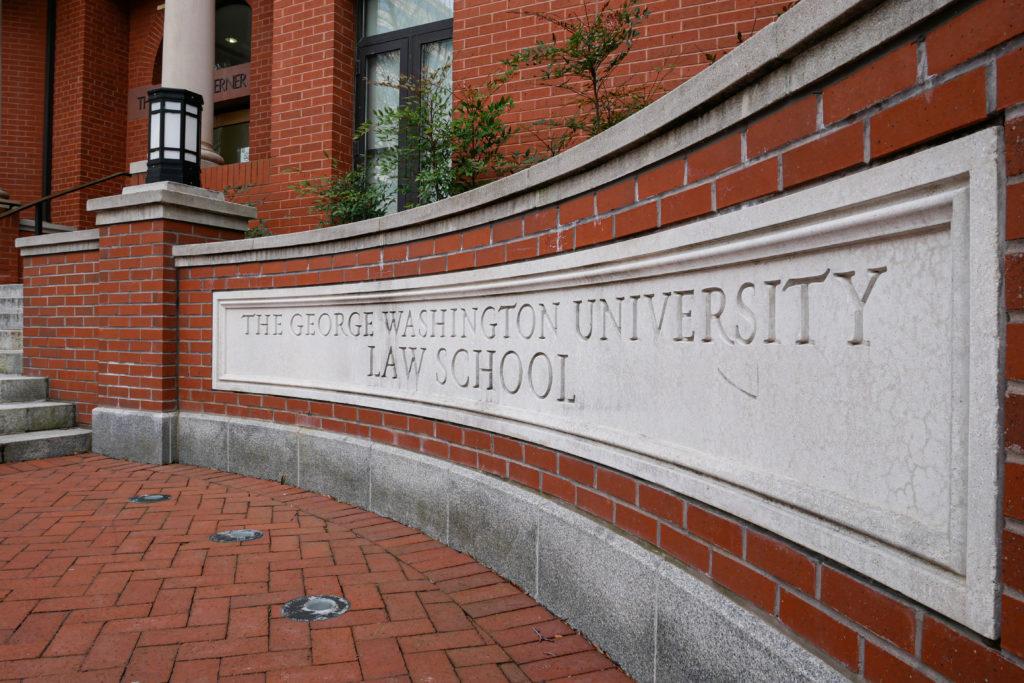Updated: April 2, 2024, at 10:43 a.m.
GW Law has established support programs and a committee to aid students studying for the bar exam as the school plans to adapt to a more situational and application-based exam in 2026.
Over the past year, the law school formed a Bar Exam Support Committee and launched two pilot programs — one to support students taking the bar for the first time and the other to assist those taking the exam for the second time. The efforts are part of a mission to better support students through the process of preparing for the bar exam and ready them for the new iteration of the test, the NextGen exam, set to be unveiled in 2026.
Andrew Realon, the law school’s associate director for student academic development, said the school formed the committee to maximize the amount of GW Law students who pass the exam. About 50 percent of law students nationwide passed the exam in 2022, and about 80 percent of GW Law students passed the exam in 2023.
The group identifies current students who may need additional support when preparing for the test and then curates those resources for them, Realon said.
“All of our current students and recent graduates receive robust support from the law school as they prepare for the bar exam,” Realon said in an email.
Realon added that the group launched a pre-bar review pilot course that currently instructs 120 students. He said that the law school worked closely with an alum who has an “expansive” bar exam tutoring portfolio to create the pilot course. Students will review legal concepts, answer practice questions with an instructor and take mock exams, Realon said.
“The goal is to prepare students to fully understand the considerable effort that it will take to be ready for the bar exam,” Realon said in an email.
The law school also offers resources like bar preparation workshops, a bar admissions readiness self-audit and a multistate bar exam readiness assessment to prepare its students and alumni seeking membership to various state bars. Realon said the law school supports recent alumni in the D.C. area preparing for the bar exam by offering weekly lunches and encouraging email messages.
The NextGen exam will assess lawyering skills, not just knowledge mastery, like the current test, Realon said. He said the National Conference of Bar Examiners is currently conducting several rounds of field testing for the NextGen exam, which is still in development.
“As information about the exam is disseminated, we will make our faculty aware so that they may calibrate their courses accordingly,” Realon said in an email.
Officials will administer and proctor the NextGen exam in-person over one and a half days, and examinees will take it on their own laptops. The test will differ in content and item format from the current bar, the Uniform Bar Exam, which has served as the exam since 2011 and is memorization-heavy and covers 14 subjects, as opposed to the eight subjects and seven skills on the NextGen, which will have more situationally focused questions. The UBE is administered on paper over two days.
Third-year law student Jasmine Masri said past assistance from GW Law about the bar exam included a stipend that covers law school-related costs. She said current support includes one of the law school’s pilot programs offering third-year law students weekly bar prep, which officials implemented this year.
Acquiring funding to pay for prep courses and registration fees is one of the largest obstacles that students face when preparing for the exam, she said. Fees to take the exam can range anywhere from $250 to $1,000, depending on what state students take the test in, according to a 2022 Reuters report. Students also shell out thousands of dollars for bar exam prep courses, the report states.
“Getting that funding for students who don’t have an employer is always one of the biggest challenges,” Masri said.
Masri said the law school plans to mitigate the cost of the exam by being more direct in communicating with students about what steps they should take to easily secure funds within the next few years — a part of which will include students being eligible to receive bar funding through career appointments and meeting criteria through the pilot program.
“I spoke to the dean of students about it, and they said that next year or in the next few years, they’re going to try and, as part of their pilot program, encourage people without employers to go to career appointments, so if they check enough boxes, they’ll be offered bar stipends,” Masri said.
Tarra Olfat, a second-year law student, said GW Law will have to shift the current curriculum within existing bar preparation courses to prepare for the implementation of the NextGen exam. Olfat said the school’s existing resources are currently adequate in preparing students for the exam.
“Within the law school, there’s a lot of bar prep courses that they offer,” Olfat said. “And then the career center and just generally the school itself does a lot to kind of inform us about what’s out there for the bar.”
This post was updated to clarify the following:
This post was updated to clarify that the national bar exam passage rate was about 50 percent in 2022. About 80 percent of GW Law students passed the exam last year.





